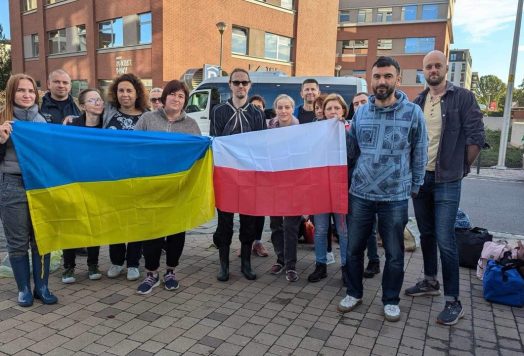Science is one of the main reasons for migration to Poland. The Foundation Ukraine together with Emilia Piechowska have decided to describe step by step how a foreigner can start studying in a post-secondary school. Currently, post-secondary schools are one of the most popular solutions in free education for migrants in Poland. Read about all advantages of this type of educational institution in the article.
What is a post-secondary school?
A post-secondary school (in Polish – szkoła policealna; in the US educational system known as a community college) is an educational institution which prepares students to work in specific professions. All medium and large Polish cities offer a variety of post-secondary schools where students can get training in many different specializations. Schools offer programs in:
- administration i.e. archivist technician, administration technician;
- healthcare i.e. pharmaceutical technician, dental technician;
- body care and beauty service i.e. beauty service technician;
- IT i.e. ICT technician, telecommunications technician;
- agriculture: agribusiness technician, agricultural mechanization technician;
and in many other specializations.
Unlike universities, post-secondary education focuses on improving the practical skills needed to perform a given profession. Education usually takes between 2 and 5 semesters. Post-secondary schools usually end with a vocational exam, which confirms the skills acquired at the school. Students who pass the exam receive the title of a technician in a chosen profession. A post-secondary school is therefore a great choice for everyone who wants to acquire new skills or confirm their qualifications in a short period.
Who can attend post-secondary schools?
Post-secondary schools are open to applicants with secondary education – who completed high school, technical secondary school, or vocational school. However, passing a high school graduation exam (matura) is not required. Applicants must be at least18 years of age when enrolled in the school or must become 18 in the year of enrollment. There is no age limit.
What are the types of post-secondary schools?
There are two types of post-secondary schools in Poland. Post-secondary schools are divided into:
- Public: schools financed by public funds. Schools follow the core curriculum of the Ministry of National Education.
- Non-public with public authority: private schools that follow the core curriculum of the Ministry of National Education.
Schools provide students with ID cards that confirm the right to use discounts in public transport and cultural institutions. Please confirm the conditions of using the discounts with the school.
Post-secondary students under the age of 26 may also be insured by the school if they are not otherwise insured (not working or insured by their parents).
Education in the post-secondary schools
Programs at post-secondary schools usually consist of 2 to 5 semesters depending on the specialization and field of study. Students can choose between full-time programs (classes during the day) or part-time programs with classes in the evenings or during the weekend. Post-secondary school programs are to a huge extent focused on developing in students practical skills needed in a certain profession. Therefore many programs require students to take an internship or complete apprenticeship.
Upon graduation, students receive a diploma and a transcript of records (świadectwo). They can also take an external exam organized by the Central Examination Committee and confirm their professional qualifications. If the exam is passed students obtain the title of technician in a chosen profession.
How to choose a post-secondary school?
Post-secondary schools usually have a wide range of programs. Their comprehensive descriptions, including the description of qualifications that alumni will acquire, are usually available on schools’ websites. Since there are a lot of different courses and programs available on the educational market these days and not all of them have the status of post-secondary school programs, it is important to double-check what qualifications and title we will receive after completing the program successfully before enrolling.
How to enroll in a post-secondary school?
The offers of post-secondary schools together with lists of registration documents and admission schedules are available online on schools’ websites (links to the websites of some of the schools located in Wrocław are at the end of the article). Most post-secondary schools are open-enrollment, meaning any student with a high school diploma or equivalent can gain entry. Some specific programs within a campus, however (such as medical programs), may have additional requirements for entry.
What documents are needed for enrolment?
Information on required application documents should always be obtained directly from the school, however each school will require you to provide:
- Sworn translation of a high school diploma with an apostille stamp. Apostille is a stamp confirming the legality of the document. In the case of a school diploma, the apostille is issued by the state ministry of education.
- a medical certificate confirming that there are no contraindications to study in a given field of study.
What are the benefits of completing post-secondary education?
- Qualifications valuable on the labour market: completing post-secondary education allows you to obtain concrete and specific qualifications needed in certain professions in a short period (one or two years).
- Experience in the profession: post-secondary education is focused on developing students’ practical skills needed in ‘the real work’. Therefore post-secondary schools require students to take an internship or complete apprenticeship. It allows students to gain first professional experiences and establish relationships with potential future employers.
- Proving your qualifications: a post-secondary school diploma and a passed professional exam prove your qualifications. With these documents, you can become a more attractive candidate on the job market and gain an advantage over other candidates who do not have their qualifications formally proved.
- Mastering Polish: all classes in post-secondary schools are given in Polish. Therefore participating in classes is a chance to practice Polish and get to know specific vocabulary needed in the chosen profession.
- Work without a permit after graduation: after graduating from post-secondary school, you can work in Poland without a permit.
Fees
Post-secondary schools are in majority free of charge for everyone (including foreigners), but there are some programs which are paid. The information about fees can be found on schools’ websites.
Post-secondary school and your residency in Poland
Attending a post-secondary school can be a basis to legalize your stay in Poland. As a student of such a school, you can apply for a temporary residency permit based due to other circumstances (taking up education). The permit will most probably be issued for one year. If the program in the post-secondary school is longer than a year, you can apply for another permit the following year.
This permit does not grant the right work within the territory of Poland. To seek employment is necessary to obtain an additional work permit unless it is not required.
Which documents to submit?
– 2 copies of the application for a temporary residence permit;
– 4 current colour photos, undamaged, 45×35 mm
– a valid travel document (2 photocopies of all its pages with stamps, annotations and entries, original available for inspection);
– confirmation of payment of stamp duty.
– documents confirming health insurance or coverage by the insurer of treatment costs in the territory of the Republic of Poland
– documents confirming the possession of sufficient financial resources to cover the costs of education, living and return;
– documents confirming the possession of a place of residence in the territory of the Republic of Poland;
– certificate/ confirmation from the school about admission or continuation of education.
The stamp duty is PLN 340.
More information on a temporary residence permit due to other circumstances can be found on the websites of Voivodship Offices.
Post-secondary schools popular in Wrocław:
Szkoła Policealna Medyczna im Marii Curie-Skłodowskiej we Wrocławiu: http://www.farmadent.wroclaw.pl/index.php?option=com_content&view=article&id=81&Itemid=18
Europejskie Studium Policealne we Wrocławiu: http://szkolyeuropejskie.pl/szkoly/europejskie-studium-policealne-we-wroclawiu/
Szkoła policealna Cosinus: https://www.cosinus.pl/wroclaw
Szkoła policealna Żak: https://wroclaw.zak.edu.pl/oferta-edukacyjna?gclid=CjwKCAjwqML6BRAHEiwAdquMnf3IqMNlEc06KDpObgoqEpJYLW_9S6_3EPQWd2_FEgsMGlQQUnpzcBoCmF4QAvD_BwE
Szkoła policealna Go Work.pl: https://policealna.gowork.pl/wroclaw?gclid=CjwKCAjwqML6BRAHEiwAdquMnRTg7wYEWGwpeK646Ob_ZPgRn-93ju90GJfhDLs9zBtA7ZvL8eNViBoCuOcQAvD_BwE
Base of post-secondary schools in Poland: https://szkolypolicealne.edubaza.pl/
Register of post-secondary schools in Poland: https://rspo.men.gov.pl/
We wish you success in studying and encourage you to contact the specialists of the Foundation Ukraine on our pages in social media.
Facebook: https://www.facebook.com/CUKR.Wroclaw/ and https://www.facebook.com/fundacja.ukraina/.
Instagram: https://www.instagram.com/cukr.wroclaw/
YouTube: https://www.youtube.com/channel/UCS9Afcq5gYybQwMTOvfeGXg.
The ReSTART project is co-financed by the National Asylum, Migration and Integration Fund Program and the state budget.






